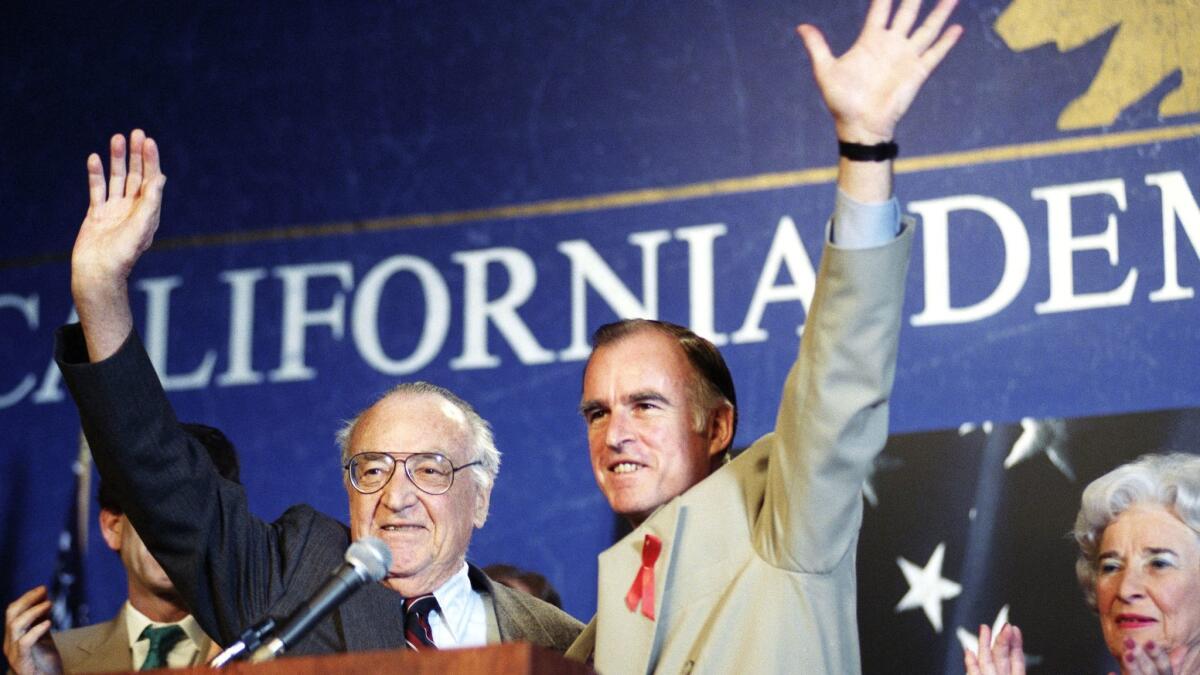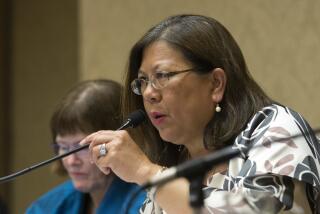Capitol Journal: A Brown — father or son — has been California governor for 40% of the last six decades

The best way to characterize Gov. Jerry Brown’s final State of the State address last week is that it marked the end of an era — a very, very long era.
It signaled the approaching end of the Brown family era in California politics.
Sixty years ago this November, Brown’s father — Edmund G. “Pat” Brown — was elected governor in a landslide election that forever changed California’s political hue. Until then, the state had been ruled mostly by Republicans. Afterward, Republicans and Democrats alternated as governor, but Democrats controlled the Legislature all but four years.
By the end of 2018, Pat or Jerry Brown will have been governor for 24 of the previous 60 years. That’s an astonishing 40% of the time over six decades — a whole lot of power and influence by one family over a state.
The governor has no children, so the Brown family chapter will soon be closed. Jerry Brown’s 16th State of the State speech was his last.
Highlights from Brown’s 15 other State of the State addresses »
Pat Brown became a builder and visionary in a time far more toxic than today because of civil rights protests and the escalating Vietnam War. He was loaded with courage, if not always good political sense. He overcame north-south rivalries to deliver an enormous state water project. He vastly expanded the highway and university systems, and won passage of an unpopular bill outlawing racial discrimination in housing.
“My father would often bring his briefcase home and when he’d go to bed, I’d read through it, all the different bills and memos,” Brown once told me. “It’s just something I’m drawn to. I know about this as much as a human being could know.”
Pat Brown also was state attorney general for eight years; Jerry for four. Jerry preceded his first gubernatorial gig by serving one term as secretary of state. He launched his second-life political comeback by twice being elected mayor of Oakland.
The point is this: Give Jerry Brown credit. He climbed the rungs on the ladder. He didn’t try to start at the top, as so many rich Californians have. He did capitalize on his father’s name initially, but proved himself first in lower office and then as an entertaining, intriguing candidate.
He also persevered, picking himself up after three failed runs for president and one voter rejection for the U.S. Senate. He loved the political game and governing that much.
“I’ve been in office and I’ve been out of office,” he told me when he was Oakland mayor. “And if I were to choose, I’d rather be in office.”
But term limits bar another stint as governor. He’s 79 and too old, presumably, to run for president again. The Senate no longer interests him.
If Brown hadn’t foolishly sought the presidency in 1980 while he was governor and worn out voters’ patience, it’s my guess he would have won his 1982 Senate race against Republican Pete Wilson. Then, as senator, he would have been in good position to beat Bill Clinton for the Democratic presidential nomination in 1992.
Brown’s 2018 State of the State speech, annotated »
As it is, he’s the longest serving governor in California history, having been elected four times. It’s a record that can never be broken under term limits.
All this history surely was in the back of Brown’s mind as he was escorted down the green carpet of the state Assembly chamber to deliver his final State of the State speech to a joint session of the Legislature.
Uncharacteristically, the governor took his time, grasping the hand of every well-wisher who thrust it. At the podium, he received a long, warm ovation, even some cheers. It was the most heartfelt greeting I’ve ever seen for Brown in the Legislature. Fellow politicians were saluting his longevity. And he immersed himself in it.
“Well, as my father used to say,” Brown told the packed chamber, “‘I accept your nomination.’ Who knows?”
As in the pre-digital days, before teleprompters, Brown read his speech from paper. Fine. It came across as sincere.
The content? Good enough. Not outstanding.
The occasion called for reflection on his long career and sage advice for novice politicians on how to deal with California’s seemingly intractable problems such as unaffordable housing and the declining middle class.
Although Brown professes not to be interested in his legacy, he spent much of the speech touting his achievements.
And he passionately defended two controversial legacy projects: the $64-billion-plus bullet train, which is way behind schedule and vastly underfunded, and the $17-billion twin-tunnels proposal for the Sacramento-San Joaquin River Delta that would complete his father’s waterworks.
“I make no bones about it,” he said. “I like trains and I like high-speed trains even better…. Look, 11 other countries have high-speed trains. They are now taken for granted all over Europe, in Japan and in China.”
Yes, but they’re countries that can print money and pay subsidies. California is a state that must balance its budget.
Brown spoke for half an hour, probably his longest such speech ever. Afterward, he lingered at the podium for 20 minutes, graciously chatting with lawmakers, posing for pictures, signing autographs and soaking it up.
It was in sharp contrast to Brown’s first gubernatorial address, in 1975, when the Legislature gave him only a polite reception and he spoke for just seven minutes.
It has been a remarkable journey.
Follow @LATimesSkelton on Twitter
More to Read
Get the L.A. Times Politics newsletter
Deeply reported insights into legislation, politics and policy from Sacramento, Washington and beyond. In your inbox three times per week.
You may occasionally receive promotional content from the Los Angeles Times.







